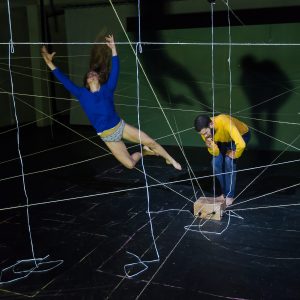We live in a lovely town with parks and shops and very good schools. We have fathers who work hard as doctors and farmers and butchers, and we have pretty smiling mothers. Our school is School Number One – the biggest and best school in the town. We have a lovely big gymnasium – see here, I’m drawing it for you, in chalk on the ground. Here are the doors, and there are the emergency exits. Only two exits, so it is easy to barricade. And over here is the playground. And beyond, the forest. On the other side of the forest, across the border, is where ‘They’ live. ‘They’ don’t have fathers that work. There are lots of bad men there, paedophiles. Their mothers are not pretty and kind. Their mothers have dark moustaches. In our school, we have assembly, and we sing songs. The song we sing most is about a Wonderful New Future.’Wonderful new future, we run into your arms.’
But for these two children, our storytellers, there is no wonderful new future. There is instead a siege. 1,148 people, the majority children, are being held hostage in the gymnasium. No, wait – 1,146. No, now it is 1,139. Numbers. Statistics.
If it was a normal day, and not a siege day, first lesson would be mathematics. The boy starts in on complicated sums. The girl has five roubles in her piggy bank. Five roubles divided up amongst 35 terrorists is – well, not a lot. But maybe they don’t all want money, the children muse. Maybe some of them want ‘peace’. More sums. Oh and remember, the two women terrorists blew themselves up, so there are only 33 terrorists. More sums. Problem solving. Maybe the female terrorists would like my Barbie dolls, says the girl. No, says the boy, they are dead, remember? And the men terrorists won’t want Barbies.
Meanwhile, it is getting hotter and hotter. The children stand enmeshed in a carefully constructed web of string and balloons. They try hard to stand still with their hands in the air, as they’ve been told to do. They are not allowed to drink. Or to talk, Or to drink. Or to wriggle too much. Or to drink. Or to pick their noses. Or to drink. They are so so so hot and so so so thirsty. The are not allowed to wee. Or to poo. Yes we are, says the girl, correcting the boy. We are just not allowed to go to the toilet. Do you need to go yet, she asks him. He shakes his head vehemently, and bites his lip.
The beauty of this extraordinary piece of theatre is the way it captures the voice of the child, the thoughts and feelings and concerns of the child, so tenderly, so beautifully. The story is a desperately harrowing one – the story of the Beslan school siege, by a group of Chechen terrorists/freedom fighters (choose your epithet) – but amidst the horror is a gorgeous and heartbreaking portrait of what it is to be a child. The Us and Them of the title is of course the Us and Them of the Russians and the Chechens; but it is also the Us and Them of the classroom. The two young adult actors – Gytha Parmentier as the girl and Roman Van Houtven as the boy – really get under the skin of the pre-pubescent children that they play. The embarrassment. The teasing. The talking-over and interruptions of each other. The vying for space. The reluctance to strip down to your underwear in front of the opposite sex, even though you are at breaking point, all crammed together in this hot, airless gymnasium, guarded over by terrorists who have strung explosives all around you.
The story of the siege is told in words – mostly in storytelling mode, directly out to the audience, each ‘child’ modifying and correcting the other’s version of events. It is told through physical action and movement movements – some big and grandiose (a repeated fainting incident), and some tiny and beautifully exact (a tug on a skirt or shirt, a small wriggle to hold in the pee) And it is told through the creation of a stunning and ever-morphing stage picture created with chalked images, string lines, colourful anoraks pegged to a wall, and a great bunch of black balloons (which are, inevitably, exploded).
But who is telling the tale? Are they survivors? Are they ghosts in the space? I won’t reveal the ending – just say that like every other aspect of the dramaturgy and delivery of the piece, this is handled beautifully by writer/director Carly Wijs and by the two talented performers.
To deliver a story like this in a way that isn’t an assault on its audience; to find the subtleties in a tale full of the most vile and horrifying facts that a news story could contain; to take such material and make it into something heartbreaking yet soulful and full of human spirit – this is a real achievement.
Work of this quality and intelligence and tenderness reminds us that this is why we make theatre; this is why we watch theatre. And breathe…
BRONKS: Us/Them is presented as part of the Big in Belgium season at Summerhall, 5-29 August 10.00
For information or bookings for all shows at Edinburgh Fringe 2016, see www.edfringe.com

